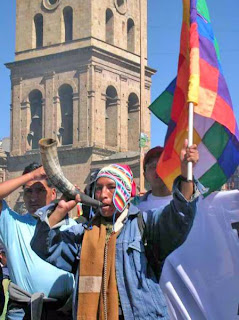"I just hope the economy keeps on growing so I'm able to look after my family," she said as a woman wearing the traditional dress of a wide pleated skirt and bowler hat bought a full set of pots.
About $2 million changes hands at the market every day.
SIGNS OF CHANGE
Many of El Alto's residents are self-employed and resist efforts by authorities to increase tax revenue by cracking down on contraband goods. That means protests and roadblocks are still a regular occurrence.
'MORE WORK, MORE MONEY'
El Alto is not the only place that is changing in Bolivia, a landlocked country of about 10 million that sits on South America's second-biggest natural gas reserves and rich deposits of silver, tin, zinc and other metals.
"People have greater purchasing power. Young people and the middle class have enough money to come to places likes this now," he said.
After seven years of economic growth averaging 4.7 percent a year, Bolivia joined the World Bank's list of lower middle-income countries in 2010. The ranking allows more credit access.
Government officials say up to a million Bolivians have entered middle-class ranks under Morales. They credit policies such as welfare payments for school children and pensioners for lifting almost a million more out of extreme poverty.
In 2006, 38 percent of Bolivians lived in extreme poverty, data from the state-run INE national statistics shows. That has fallen to about 25 percent though nearly half of Bolivians are still poor, according to the United Nations.
Some sectors have done better than others. Critics say a disproportionate amount of public money has been poured into the steamy Chapare region that is home to much of Bolivia's illegal coca crops and a stronghold of Morales support.
Mining cooperatives have won significant political concessions from Morales and a few have grown rich due to soaring global metals prices.
In mining cities like Oruro and Potosi, famous for the Cerro Rico (Rich Mountain) of colonial times, newspapers carry stories of miners-turned-millionaires and fantastic earnings luring fortune seekers from other parts of the country.
While most of the cooperative miners scrape a living working in dangerous and precarious conditions, a few have become wealthy enough to buy expensive cars and invest in real estate.
"This amazing mining boom has helped develop markets in places no one ever would have imagined," said Christian Eduardo, president of the CADECO construction industry chamber in La Paz.
Construction activity has been growing at an average of about 10 percent per year since 2007, forcing the over-stretched local cement industry to meet demand with Peruvian imports.
FISCAL CONSERVATIVE
To the surprise of his detractors, Morales -- an ally of Venezuela's Hugo Chavez who shares his penchant for fiery leftist rhetoric -- has proved a fiscal conservative. The country is expected to register its seventh-straight annual fiscal surplus in 2012.
Morales, 53, has nationalized areas of the economy from the vital natural gas industry to telecommunications companies and tin smelters, but he has also let the central bank's foreign reserves swell to record levels and warded off the scourge of high inflation that battered Bolivia in the 1980s.
The economy is expected to grow more quickly than many of its wealthier neighbors this year and should maintain a healthy 5 percent expansion in 2013, according to the latest International Monetary Fund (IMF) estimates.
"Bolivia is no longer a country with a weak economy," Economy Minister Luis Arce said last month after the nation sold its first global bonds in almost a century.
Most analysts said the interest rate of less than 5 percent was low considering Morales' record of nationalizing companies, often without prior notice or paying compensation, and it has proved an unlikely public relations success for him.
"The interesting thing is that Bolivia sold the bonds at half the rate paid by Venezuela. That's an important message to the world," said Horst Grebe, director of La Paz-based research institute, Prisma.
"The problem is that Bolivia's biggest growth is in its macroeconomic numbers. What we're not seeing is a transformation of the productive economy that is sustainable in the long term."
Bolivia remains acutely dependent on exports of non-renewable raw materials. Natural gas and metals accounted for 87 percent of last year's record $9.1 billion export earnings, said Gary Rodriguez of the Bolivian Foreign Trade Institute (IBCE).
'DRUNK ON POWER'
But as Wall Street economists laud Morales' macroeconomic policies as prudent, critics at home say he betrayed supporters by watering down policy pledges and pandering to big business.
But despite his continuing domination of the political scene, Morales has lost his initial aura of invincibility since some allies turned against him over an Amazon highway plan and a fuel price hike two years ago.
Government critics from the left and the right would like to see strong challengers emerge in time for a 2014 presidential election in which Morales has hinted he may seek a third term.
"The government's made a lot of mistakes ... they've got drunk on power," Quispe said, accusing Morales of seeking to stifle media criticism and control the judiciary.




No comments:
Post a Comment